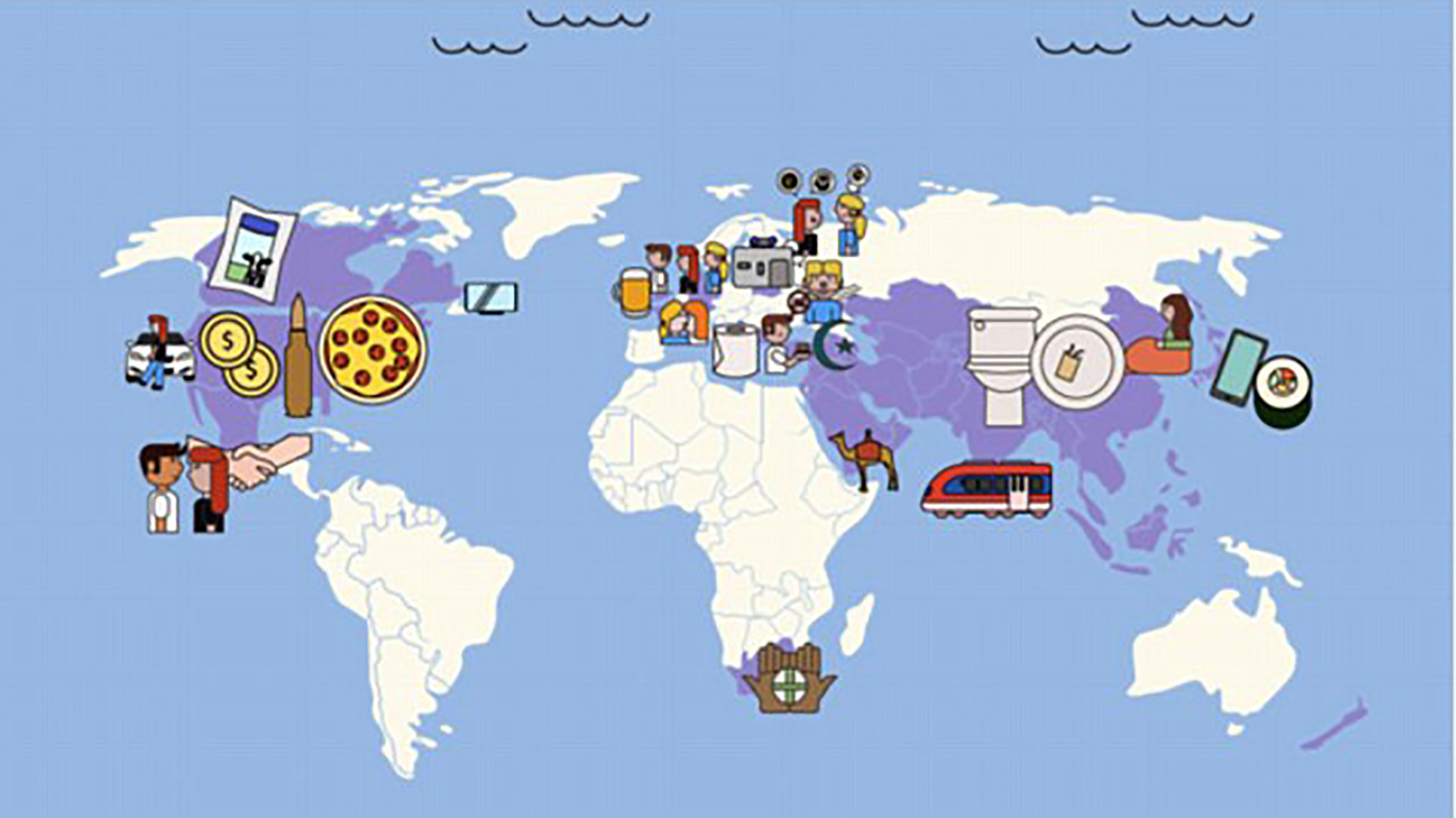Shocked by our Culture Shock!
Moving abroad, whether it be for studies or family relocation, will no doubt require copious amounts of preparation. “How many pairs of socks should I pack?” “Do you think this dish will taste the same there?” “Can I bring all the clothes in my wardrobe with me?” And these are just questions concerning the practical aspect of moving abroad, there is also the more emotional side to be thought about, more specifically, learning how to embrace the inevitable ‘culture shock’. Some of you may say “Culture Shock? Not for me. My parents are from there, so I should be fine”. However, this feeling has the ability to creep up on you when you least expect it. When you first move abroad, most will only carry with them an idealised view of their situation, you may feel anxious and nervous, but your euphoria will tend to take over. The term ‘culture shock’ may be an unheard term to some of you; culture shock is an array of emotions, it is the feelings of anxiety, loss, confusion that come from both the challenge of new cultural surroundings and from the loss of a familiar cultural environment. The concept of culture does not only refer to the difference between one’s own and the host culture, but this concept can also be used for organisations, institutions, and groups. As a result, even a simple reorganisation may generate culture shock. Two students -Alyssa & Grace- will be expounding on the personal experiences each of them had with culture shock, they too mistakenly thought they would not be susceptible to such a feeling.
Alyssa

“So, where is home?”, “No, but where are you really from?”, “What accent is that?” These are some of the questions that will automatically make the hairs of most third culture children stand up, they are instantly filled with doubt as to whether these questions are referring to their nationality, their ethnicity, their place of birth or where they’re living now. Being a third culture kid myself, I understand the struggle. I am quarter Irish, quarter English, and half Chinese. However, I have spent most of my life living in Malaysia. Consequently, there is a lot of disparity in the answers I give to such questions; I will usually choose the quickest answer: Malaysia. Other times, however, I will tell the full story: that I was born in Malaysia, had moved to China, then back to Malaysia, and finally to the UK.
“Third Culture Kids” is a term coined by the American sociologist -Ruth Hill Useem, those who fit this bill tend to mix and merge their birth culture with their adopted culture, thereby creating one of their own: a third culture. I find it almost impossible to provide a quick and simple response when I am faced with questions about my background, I will always feel the need to explain myself and defend my origins. Although I was born in Malaysia, I am aware I don’t look typically Malaysian. Yet, I feel most comfortable when talking about Malaysia, it is the country I have spent the most part of my life in. As I have never lived in Ireland and I have only just moved to England, I too feel strange saying I am from either one of those countries. This is despite both England and Ireland being countries where I have family and are places that I think of with nostalgia. Living like this can still sometimes feel quite liberating, not only does my background make an easy talking point, but I am also able to reinvent myself by omitting certain parts of my story in order to make my identity more palatable to others. I don’t want to sound like yet another multiethnic kid who claims that their lives were destroyed based on the sole fact that they did not belong to just one racial group, because in reality, it was not.
Race was never an issue when I was growing up. I was fortunate enough to have been born and raised in Malaysia, a country that prides itself in their diversity of race, culture and religion. Being in a multicultural, multiethnic and multilingual country, I was rarely conscious of the disparities between my genetic makeup and that of others. This lack of attention I had towards race was also developed through the different education systems and the different languages I spoke. Naturally, English was my mother tongue and is understandably the language I am most comfortable with. However, I was also taught how to read and write both Mandarin and Bahasa Malaysia (Malay) from a young age. I was placed in a local Chinese vernacular primary school from Year 1 to 6, where all lessons were primarily taught in Mandarin, and Malay, with Mandarin being the primary medium of instruction. This not only removed any potential language barriers I may have faced but also ensured that I have never felt like an outsider in Malaysia. Even though I was one of the very few European children in that Chinese school, I felt more of a culture shock when I later moved to a British international school (Alice Smith) within Malaysia. The stringent focus on discipline and hard work which grounded the Chinese education system was starkly contrasted with a refreshing focus on creativity and diversity. The cacophony of cultures and races in which Alice Smith’s student body comprised meant that not only was I exposed to a wide array of people from all over the world, the continuous celebration of diversity and inclusion also created a heightened awareness of the dynamics of cultural differences. This international environment in which I was quickly submerged into allowed me to believe that the term -culture shock- would no longer be in my vocabulary, my migration to England proved otherwise.
There is no doubt the term ‘culture shock’ is one that many students who are currently studying abroad will be able to relate to, it is essentially the disorientation and change that is experienced after an international relocation. This ‘shock’ primarily stems from the changes in weather, culture, language, mode of dressing, and food; everything will appear abnormal and you may often find things difficult to comprehend. England was never a country which I regarded as foreign and treated with unfamiliarity; I had a house there, half my family resided there, (and are still residing in the UK now), and I was always in the UK for at least 2-3 months a year. However, after moving to the UK for university, I realised that I was not at all accustomed to the myriad of differences in customs, behavior patterns, and humour. Despite English being my first language, I occasionally struggled when trying to understand those with different English accents, there were also copious amounts of phrases and slang which I had never heard of before and therefore had to take some time getting used to. At times, I also felt this irrational need to alter my accent so I sounded more British, thereby drawing less attention to myself. One of the first things I noticed was the student halls, where both boys and girls lived on the same floor and we had gender-inclusive bathrooms. Malaysia is considered by many to be a conservative country, male and female students were rarely asked to live together, much less share a bathroom; whilst I was perfectly fine with the gender-neutral nature of my accommodation, I was understandably still quite surprised. Many of the differences which I noticed were small, but nevertheless significant for someone unused to them.
I did, however, notice a similar trend amongst many of the international students in the university. Many preferred to stay with those from the same country, some avoided people and things they were not familiar with. This phenomenon is widely present in both Asian and European communities: these students cook, eat, and study together, unintentionally creating an obstruction in intercultural contact. Having lived in Malaysia for most of my life, I naturally felt most comfortable with the other Malaysian students. There was not a language barrier since all of us could communicate in either English or Mandarin. On several occasions, however, I did feel like an outsider. This was partly due to the different schools we attended in Malaysia -I had only spent 6 years of my life in a Chinese school, whilst some had spent double the time. I was starting to feel more anxious then, worried that I would never be able to fit in, that I was too different and no one thus understood me. After joining multiple societies and sports clubs, which thereby enabled me to meet more people, I now know that I was undoubtedly blowing things out of proportion. Whilst it is natural to worry too much about minute aspects of your social life, this worry should still not act as a hindrance towards you achieving that ‘university experience’. Most students will no doubt experience some form of ‘shock’ when they begin university, embrace it! Everyone eventually adapts to their new surroundings and this initial ‘shock’ is then long forgotten.

Grace

Having studied in an International British school in Thailand since the age of four, I thought I had understood and absorbed a significant amount of British culture throughout the years. However, I, too, was not spared the ‘culture shock’ when I transferred to a school in England at the age of 13. One of the most important things I have learned from this transition was that being physically present in the country itself and spending the rest of my highschool life there had revealed many layers of the culture and social norms that I would have never encountered if I remained to study in my home country. It is safe to say, the thrill of navigating through the new environment was equivalent to riding a rollercoaster (in a good way, of course).
For me, the biggest change I had to adjust to was the relatively more expressive nature of the British. Similar to Malaysia, Thailand is also considered by many to be a conservative country; this is especially true for those of the older generations, although the current Thai generation has become more flexible towards cultural integration. In contrast, when I first started off living with other UK students, I was surprised by the open nature one shows their friends -greeting each other with a hug or some females even kissing each other on the cheek. As a person, I used to have a timid, quiet personality but after spending several years here, I have to admit that this element rubbed off on me. I grew to enjoy the openness that enabled me to get closer to my foreign friends, this also helped me become more straightforward and confident when expressing my opinions to others, including in the classroom.
Spending life in the UK had me thinking deeply and reconsidering my identity at times. As I absorbed these newfound cultural norms, there were instances that these elements clashed with my Thai culture self, particularly with the older generation of my family. Additionally, amidst the fun adventures I had during my time here, I did encounter a few small stereotypical incidents that most Asians will experience; the assumption that we study all the time can only be good at academics and the fact that we look the same... Even though it was upsetting at times as this undoubtedly stirred up some insecurities, the process of overcoming this has improved my patience and helped me to appreciate my racial qualities. In the end, I felt that it did not matter which end of the spectrum one fitted in, rather, it is more important to do what one feels most comfortable doing without troubling those around them or having to sacrifice a part of oneself as well.
During the first few months of my transition, I initially felt there to be a language barrier. With the numerous amount of British slang being spoken at me, I quickly came to the realisation that there was indeed a lot to learn. I remember when a friend asked me how many ‘quid’ I had or whether I wanted to go to the ‘tuck’ shop together, my 13-year old bewildered face amongst the awkward silence that followed would probably be amusing to many. As one who enjoys watching Sherlock Holmes and, of course, listening to his British accent, I can admit spending time in England has helped me get closer towards achieving this refined accent.
Religion-wise, growing up in a Buddhist family led to me being a solid Buddhist myself with little knowledge of other religions. After enrolling in a UK high school that was essentially filled with dedicated Christians, it was an interesting experience to partake in their activities. A notable one for me was the daily hymn singing and prayer were in the end, I did come to feel fond towards a hymn called “Shine Jesus Shine”. And of course, how can one forget to talk about the food? Having only eaten Asian cuisine (Thai, Chinese, Korean, Japanese… you name it) most of the time when I studied in Thailand, I was definitely not accustomed to the full three-meals-a-day. Although I have had an overdose of potatoes and fish n’ chips, special food occasions like Sunday roast and afternoon tea were definitely enjoyable. Since I have a sweet tooth, scones with clotted cream and jam were a must. I also had a great time sharing Thai ‘tuck’ with my friends. Looking back, I still clearly remember my younger self being a proud presenter of mama noodles whilst trying hard not to laugh at some of my friends struggling with the spiciness.
After several years of studying in England, it is safe to say I have become quite accustomed to British culture and norms. Nonetheless, the move to university was another huge change, particularly the exposure to such a large variety of cultures. From the feeling of moving from a fishbowl to a lake during my high school years, this felt like exploring the ocean. Learning to adapt and become more flexible to other cultures and their respective values was a whole new chapter in my life.
Whether it be for studying purposes or family relocation, the move from one country to another undeniably results in many changes to anyone both psychologically and physically. Many of you will relate to this after transitioning to university. It is normal to experience ‘culture shock’ due to the difference in customs, food mode of dressing, and even weather. It is natural to feel the presence of these temporary barriers that may prevent you from settling in immediately. Nevertheless, as long as you keep an open mind without fearing intercultural contact, anyone can adapt and come to appreciate the richness that the cacophony of cultures and racial inclusion brings. Do not let your fear of ‘culture shock’ stop you from enjoying the beauty of cultural diversity; face it, embrace it, and have fun.







